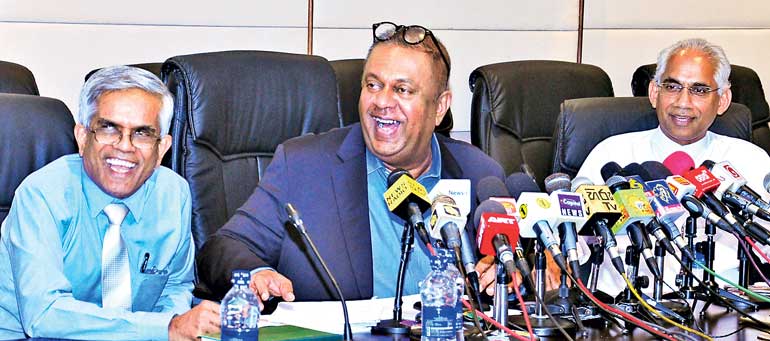Saturday Feb 21, 2026
Saturday Feb 21, 2026
Tuesday, 3 April 2018 00:20 - - {{hitsCtrl.values.hits}}
 Finance Minister Mangala Samaraweera jokes with the media flanked by State Minister of Finance Eran Wickramaratne and Treasury Secretary Dr. R. H. S. Samaratunga at the briefing
Finance Minister Mangala Samaraweera jokes with the media flanked by State Minister of Finance Eran Wickramaratne and Treasury Secretary Dr. R. H. S. Samaratunga at the briefing
yesterday – Pic by Sameera Wijesinghe
By Uditha Jayasinghe
Barely a day after the new Inland Revenue Act (IRA) came into force, Finance Minister Mangala Samaraweera and his deputy Eran Wickramaratne stepped out to fight anew on an old battlefield, insisting the regulations promoted social justice by raising an estimated Rs.30 billion in additional revenue,and slammed detractors for misleading the public.
The IRA, which was passed last year, came into effect on 1 April 2017, renewing old arguments and gaining media attention. Samaraweera dismissed concerns raised by the Opposition, pointing out that the Government had extensive consultations with stakeholders, including the private sector and political parties such as the Joint Opposition, before the legislation was passed. He also insisted that many of the concerns raised by them had been addressed, and criticised Opposition politicians for what he termed attempts to mislead the public.
Both Minister Samaraweera and State Minister Wickramaratne recapped clauses that include income tax being exempted for individuals earning under Rs.100,000 per month, an exemption on remittances, tax holidays for investors, and additional provisions to investment funnelled to the war-affected north. Pensioners earning interest of Rs.1.5 million per annum would also be exempted from taxes, while any higher amount would come under 5% tax.
The duo also provided clarification on several questions raised on remittances, and defended taxing foreign currency accounts, pointing out that at a time when Sri Lanka has high reserves, it was possible to treat foreign currency and local currency savings with the same yardstick.
“This Inland Revenue Act is the most progressive in South Asia. It was formulated with the aim of delivering social justice. Sri Lanka cannot maintain its universal healthcare and education policies without sufficient income. Moreover, with the current dependence on indirect taxes, the poor people have to bear the larger burden of taxes, while higher earning professionals and others do not. This is not an equitable system and this legislation was aimed at making the tax system fairer,” Minister Samaraweera said.
He also noted that he had instructed the Inland Revenue Department (IRD) to open about 200 new income tax files each month to track the widening tax base. Removal of complicated exemptions, as listed out in the 2006 regulations, would also increase the tax net, officials said. Since the Government is likely to get revenue from only two quarters in 2018, the target is to raise Rs.30 billion in additional taxes, while the amount is set to double in 2019. The aim is to gradually increase revenue to meet the Government’s target of 3.5% Budget deficit in 2020, and also improve direct taxes to hit a 60:40 ratio. Sri Lanka currently has only 1.6 million income tax files.
However, concerns raised on the application of inheritance tax may be clarified in the future, as questions on valuations had been raised, Wickramaratne acknowledged.
“We understand that the current 15% VAT is viewed as a challenging tax and with Government revenue gradually increasing, we can consider revamping VAT. The Government has already increased education spending to 2.4% of GDP, which we intend to increase to 3% of GDP and healthcare from 1.4% of GDP to 2% of GDP. We have also decided to allow the construction industry to continue its current taxes for another year, which means that 15% VAT on condominiums and apartments priced above Rs.15 million will be deferred till 2019,” Wickramaratne said.
They also pointed out that while Sri Lanka’s tax revenue is currently about 18% of GDP, Malaysia’s was 72%, India’s 54%, South Korea 45%, and even Bangladesh was 32%, leaving the Government with the massive challenge of funding public expenditure.
Despite several changes in taxes, Minister Samaraweera noted that no discussions were being held on potential changes in fuel prices, indicating that the Government intended to maintain current prices despite high losses by the Ceylon Petroleum Cooperation (CPC).
“The Inland Revenue Act is an effort to change 70 years of tax mismanagement and wastage of public funds. It is an attempt to improve governance. No longer will anyone have to sit outside my office or the Minister’s office seeking information. It is all laid out in black and white and we have no intention of making significant changes to this Act,” Wickramaratne told reporters.